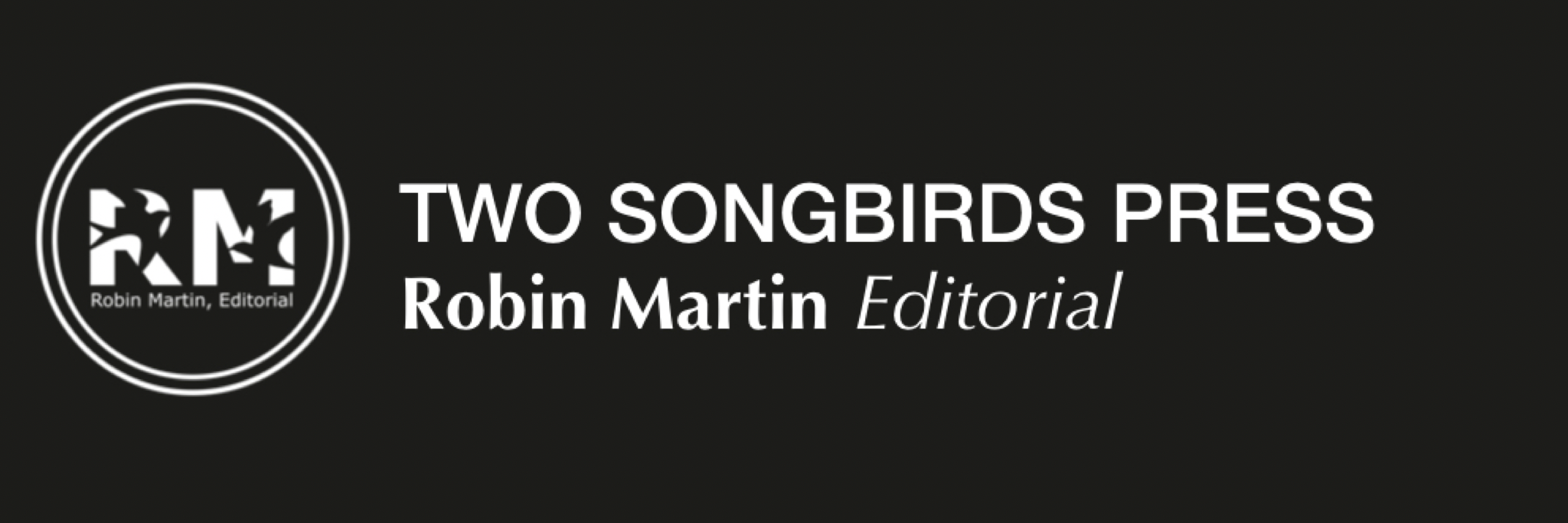Editing for Writers
Two Songbirds Press
I am an editor for hire, a publishing consultant, and perform all levels of editing for writers of books, essays, and stories. My job is to take your manuscript and help you meet your goals with it.
Take a look at the answers to Frequently Asked Questions below. To discuss editing rates and your project goals, please use the contact form and fill out the Editorial Services Survey.
Our Services

In a complete and thorough reading, I provide a 4-5 page letter with general observations on the accessibility of the manuscript to the intended audience, the strength of characters and plot development, success or shortcomings of writing craft issues–such as point of view (narration), diction (choice of words), syntax (structure and patterns of sentences)– and note patterns of mechanical/usage error and inconsistency, without doing any actual editing.
This is a process, always the first step, that I go through with any client who wants to work with me as an editor. It is necessary to determine the scope of the work required.

Which publishing path is best for your project? Do you want to learn about how to find an agent, query a small publisher, or self-publish your book? Want to learn about ebook publishing? Need to build an author platform but don’t know where to start? I leverage my professional affiliations to benefit your project and help you meet your goals.

If you want to know if your manuscript is ready for publishing, please reach out to me about a manuscript evaluation. If you want to discuss whether self-publishing is the right route for you, please contact me for a consultation. If someone told you that you need to have your book edited before self publishing, I can help you with that, and also with finding someone to do your interior layout, cover design, and formatting for upload to your publishing platform.
There are so many resources out there to help self-publishers, and you can take a look at my resource page (coming soon) for my favorite recommendations.

If your manuscript requires significant revision, such as rewriting and reorganizing the text, character or plot building, or heavy copyediting of diction (choice of words), syntax (structure and patterns of sentences) etc., to develop strong point of view or voice, I can do that with you. I provide professional writing help. I work with your story, with your voice, in partnership with you, to help you generate the story you set out to write.
There are two approaches to this that I like, and in collaboration we will choose one or a combination.

Copyediting includes fixing sentence-level errors (such as parallel structure and modification); maintaining consistency in objective and tone; creating and implementing a consistent style guide for capitalization, bulleted lists, symbols, italics, scare quotes, numbers; making suggested revisions to organization; and working closely with you to preserve intent and voice. To discuss copyediting rates, please contact me.

While proofreading, I check the text for errors, including typographical errors and problems with typesetting specs and layout. This can be done on a completely edited manuscript just before layout and design, but should always (also) be done after layout on a print-proof aka galley (usually a .pdf). This does not require a complete manuscript evaluation before starting work, but it does require that I see a sample of the writing and a discussion about style guide preferences or requirements. To discuss proofreading rates for your project, please contact me.
Endorsement
Frequently asked questions
My rates are determined by many factors, not the least of which is the scope of the project, but are always fair and aligned with other editors with similar background and experience. There is no charge for the initial 15 minute phone consultation.
The work I do is in partnership with a client, and so communication between myself and the client is key. I ask that anyone inquiring after services first fill out the Editorial Services Survey. After receiving this, I like to arrange a no-fee 15-30 minute phone consultation regarding expectations, scope, and deadlines. When it is time to proceed, I request a sample of the potential client’s material or project. If we are a good match, I provide information about the freelancer-client relationship, a job estimate and contract, and we go from there.
You will be working directly with me, Robin Martin. I am a freelance writer and editor and an active member of The Editorial Freelancers Association. I have a Masters’ degree in English (Writing) from California State University, Sacramento and a Bachelors’ degree in English from Rutgers College.
My client list includes business owners in the financial, public speaking, motivational, health, educational, arts, web design, and trade industries. You are the expert in your subject; I am an expert communicator who helps you communicate clearly to the people you want to reach.
I am the managing editor of the creative non-fiction micromagazine Under The Gum Tree, where I perform the whole variety of editorial tasks, navigate an online submission manager, and manage and train a small volunteer staff.
While working with a nationally-known literary agent, I reviewed queries and proposals, acquired manuscripts for representation, performed developmental and line edits with writers, advised substantive edits, researched publishers, developed proposals, created pitch lists, and pitched manuscripts to publishers. Books I worked on were acquired and published by Wiley, Career Press, and Gibbs Smith.
During my tenure as an assistant editor for an internationally-acclaimed literary magazine with more than 120,000 readers, I evaluated manuscripts for publication. As a first-reader, promote-to editor, and a finalist contest judge, I was part of a team with Tom Jenks and Carol Edgarian that found the likes of Anthony Marra, R.A. Costello, Marlon Jiminez, Adam Prince, and many other fine writers in the submission queue.
More details about my professional career can be found at Linked In.
The primary job of an editor is to take your words and turn them into your final product, but editors also manage projects and hire the writers and other contractors. Editors may specialize.
Developmental editors develop a book or other project from the initial concept onward, working closely with the author or client to study competing works and create a product that stands out.
Content managers, project managers or project editors see a project through from start to finish. They supervise and coordinate the editorial process and when necessary hire writers, copyeditors, proofreaders, indexers, and other editorial workers.
The terms substantive editors, content editors, and line editors are often used interchangeably for editors who make significant changes to a manuscript, such as rewriting and reorganizing the text.
Copyeditors correct spelling, grammar, usage, and punctuation, check cross-references, and prepare the style sheets that guide consistency and accuracy across the manuscript.
Proofreaders check the text for errors, including typographical errors and problems with typesetting specifications and page makeup.
The role of the copyeditor is as broad as it is important. Copyeditors correct spelling, grammar, usage, and punctuation, check cross-references, and prepare the style sheets that guide consistency and accuracy across the manuscript.
Proofreaders check the text for errors, including typographical errors and problems with typesetting specifications and page makeup.
This is something we figure out together, based on your goals and my discoveries during the manuscript evaluation phase of our work together. This is necessary to determine the scope of the work required.
There are two approaches to this that I like, and in collaboration we will choose one or a combination.
The first approach is editor-led, where I use the Track Changes and Comments function in MS word to make or suggest edits to the content then send it back to you, where you can either accept or reject the suggestions. We usually make two passes through the entire ms.
The second approach is writer-led, where I act as a writing coach to you in personal one-on-one sessions, in order to help you really understand the craft and revision process, and what theories drive editorial suggestions you’ve received, and you make the revisions on your own. This is more intense skill-building. There is homework.
Both the editor-led and the writer-led processes involve one-on-one virtual conferences where we continually clarify your goals for the manuscript.




